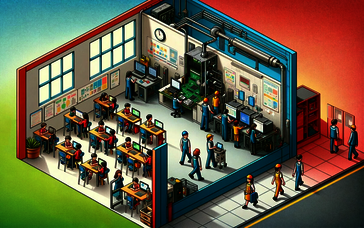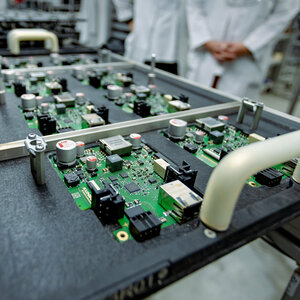Open Source in the Industrial Environment

Why did KUNBUS decide to enter the industrial world with an open source operating system in 2016?
Nicolai: Because the openness of open source was already the future in 2016. For KUNBUS, an important point at that time was that many developers were already familiar with Linux and especially the Raspberry Pi environment. I haven’t found the Revolution Pi in any other way: I was looking for an industrial hardware that offered the open possibilities of the Raspberry Pi. And because of the similarity to the Raspberry Pi, there is an almost endless number of software components that can be used with the RevPi. Our customers can choose or assemble applications from many packages. In the best case, we get a short note via our forum when someone has found and used something suitable. Then, according to the open source idea, other interested parties can profit from it.
With our fieldbus gateways, we were able to offer connectivity in all established directions of the industry. Additionally, it was important not only to install Raspberry Pi OS, but to create a version suitable for the industry. Through these two aspects, the open source approach already worked in 2016.
KUNBUS also discloses its circuit diagrams for its devices. How far can open source go in hardware?
Nicolai: Of course, it can go as far as real OS hardware, where all the design data and everything else you need to build is published. But you don’t want to make it too easy for competitors in the end (laughs). At the same time, we want to make it as easy as possible for customers to check whether the RevPi fits into their applications or not. That’s a trade-off in the open source sector: you open yourself up, but you may also get feedback on the solutions offered. Be it in the hardware area or, as is more common, in the software area.
How have we anchored the open source idea at KUNBUS?
Nicolai: We hire people who live this idea. We encourage people to contribute to open source projects during their time at KUNBUS. Only if you have colleagues who understand what it means to develop open source software, we can be sure that we provide good open source software to the community out there.
To give an example, many of our software developers are actively involved in the mainline development of the Linux kernel. And we are also in regular contact with the Raspberry Pi Foundation when we or our customers find bugs on the image or have suggestions for improvement. Then we make a bug report, try to solve it together, and make the solution available for integration, which is sometimes also included by default.
As a company, just consuming open source and expecting feedback does not correspond to the open source idea, you have to contribute in the same way. And a company has to actively live this.
So we also give, but from which projects do we benefit?
Nicolai: Well, we clearly have our image, which is based on the Raspberry Pi OS. Inside that is our configuration solution, including our PiCtory, which you can use to click together your RevPi setup. Of course we also benefit regularly from the community maintenance of the Linux kernel, since we don’t contribute exclusively. Then we integrated a Modbus adapter, basically as a virtual gateway expansion module. We could use the existing libmodbus implementation for this, eliminating the need to create our own protocol.
Then the Python library RevPIModIO by Sven Sager, who is now our colleague, should not go unmentioned. With this library, you can build everything relevant to the RevPi. Last but not least Node-RED is preinstalled, which offers customers a quite easy way to write logic-based applications without actually writing a line of code. Without these open source offerings, the RevPi would definitely not be what customers can now hold in their hands.


